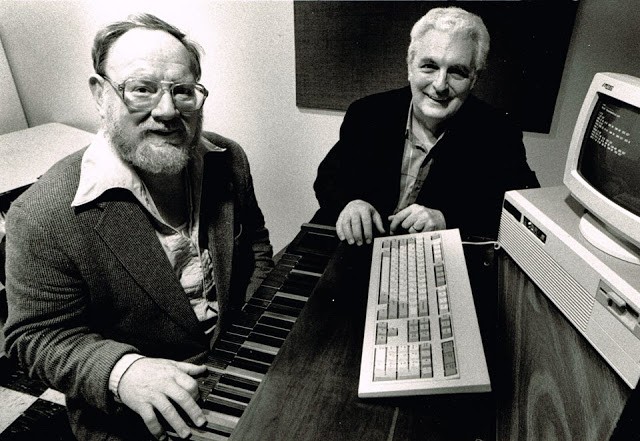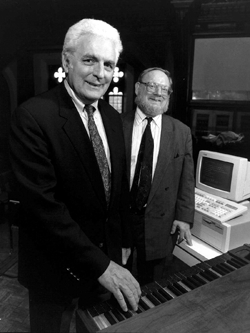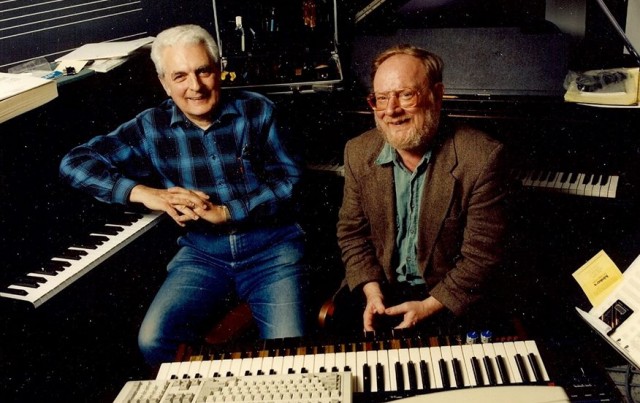
American composer John Charles Eaton (March 30, 1935 – December 2, 2015 ) has died.
Eaton is best known for his operatic works, but also composed for electronic instruments and also collaborated with instrument designers on some pioneering instruments, including the Eaton-Moog Multi-Touch Sensitive (MTS) keyboard – a precursor to today’s Multidimensional Polyphonic Expression (MPE) MIDI controllers.
 In a 2012 interview, Eaton explained the idea behind the MTS keyboard:
In a 2012 interview, Eaton explained the idea behind the MTS keyboard:
“In earlier electronic music, the one element I almost always found missing was human nuance. I believed that would only enter if composers had more control in performance over the various aspects of electronic music.
I asked Bob if he could design a keyboard that would allow much more control over all aspects of the musical continuity. I suggested that each key have four different sensitivities, derived from keyboard and string instruments:
1) the amount a key is depressed;
2) the front-to-back position on the surface of the key;
3) the side -to side position on the surface of the key;
4) the amount of pressure added to a completely depressed key.
(Later, Bob was to add the amount of area a finger covered on the surface of a key.)
These sensitivities should be able to be applied to any aspect (parameter) of the music made available by a dedicated computer. A larger touch-sensitive plate on the side of the keyboard could make the x, y and z axes of each key applicable to general control of the musical continuity. Banks of dual-action pedals applied to each keyboard could also control more general aspects of the music.
You, of course, wouldn’t have to use all of the sensitivities at once. And you should be able to change how the system works instantaneously.
That very night, the Eaton-Moog Multiple Touch Sensitive Keyboard was born. “

“We are deeply saddened to learn of the passing of the brilliant Dr. John Eaton, an innovator in avant-garde opera and in the composition and performance of electronic and microtonal music,” shared Michelle Moog-Koussa of The Bob Moog Foundation. “He was the inspiration for the Eaton-Moog Multi-Touch Sensitive keyboard, which Bob devoted almost 20 years to completing and which he considered his greatest contribution to the world of music.”
Here’s an interview with Eaton by The Snapshots Foundation. where he talks about his experiences with the Synket & Moog instruments:
You can find another interview with Eaton at the NAMM site, as part of their NAMM Oral History Program.

II had the pleasure of working across the hall from John Eaton and Dr. Moog in the early 90’s when they were developing the expressive keyboard, and writing for it. I was lucky enough to play it, and help them do some live shows with it at Mendal hall and do sound etc… He was an adventurous artist, and contributed a lot. He always wondered about the wierd noise I was making across the hall at the University of Chicago Goodspeed Hall. A great man, and composer, and these ideas would obviously be implemented in future tech (such as the animoog, and I never thought he got enough credit for that… R.I.P sir.
and thank you for posting this synthhead, it is nice to know that some of the true pioneers are still given respect.
Lyle – thanks for sharing your memories of Dr Eaton.
I had the life pleasure and honor to know John since 1970, when he lived at 828 S. Woodlawn, the epicenter of music shenanigans at Indiana University. I got to be backstage to see John work and hear about this ideas for music and life and cooking, and to hear him laugh. He was joyously creative and humane and brilliant. I am devastated by his loss. His genius in the arts and art of living is on an epic scale.
The greats are all slowly leaving us. It’s sad.
It is up to the living to fill the voids left by these losses. Fuel your passion and who knows, you too can achieve “greatness”. There is still a fair amount of room for pioneering in the realm of electronic music and the areas that make up electronic music. There is no denying this person’s dedication and contributions, but the baton is waiting for another outstretched hand to grab it and run the next section of the relay 🙂
I certainly believe that there are many voids to fill, and certainly many horizons to attempt to cross remaining in electronic music! (otherwise what would be the point! :))… and as in every aspect of life, sure, batons are passed, and should be.
I also believe that honoring and remembering the pioneers that existed before is of utmost vital importance. We are all standing on the shoulders of giants, whether it be Mozart, Dr. Robert Moog, Dr. John Eaton, and many more…. recognition of this sometimes seems to be lost upon the youth, and I imagine every generation feels the same in that regard… but again, I am thankful to synthhead for posts like this (and many others), that put all our passions and work into historical and human context.
I am as excited as the next guy to read this page and find out about future tech and ideas, but also appreciate posts that present in perspective of how we got here.
This is how I learned of Dr. Eaton’s passing sadly, but I am thankful, and I have sent this column to friends around the world that did not know, and appreciate the context in which it was presented.
In addition to my time as Marketing Manager at Moog Music, I also did some printed circuit board design for Bob back in the 90s. The Eaton-Moog Multi-Touch Sensitive Keyboard is the project I worked on. Very proud that Bob considered it “his greatest contribution to the world of music”. I think of these guys every time I play one of the now many products and instruments that do similar (and greater) things… the Haken Continuum, Linnstrument, Roli Seaboard, and many, many others, from hardware to iOS apps.
The following is my eulogy to my friend John Eaton. presented at a memorial held at his New Jersey home not long after his passing, and as his ashes in an urn rested on his piano.
ODE TO JOHN EATON
How much the man:
he was on his way to a concert
to be in the company of music makers all.
The muse called and he responded —
it was his way, to the end.
For all the time we knew him,
his was an elegant mind.
And those who knew him best
knew him as he most surely was.
But most of us only knew his musics,
his brilliant aspirations
beyond the familiar,
beyond the expected,
beyond the merely beautiful.
He illuminated possibility,
courting an enchantment
and a furtive dalliance
with sounds lurking in that
other realm of first hearing.
He regaled us with surprise,
it was his delight.
He was a magician
whose wand described
what passed for notes.
But it was all really
lights and stardust.
And he’s now gone there,
for a visit.